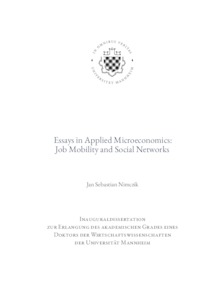|
Essays in applied microeconomics : job mobility and social networks
Nimczik, Jan Sebastian
![[img]](https://madoc.bib.uni-mannheim.de/42971/1.hassmallThumbnailVersion/dissertation_jan_nimczik.pdf)  Vorschau |
|
PDF
dissertation_jan_nimczik.pdf
- Veröffentlichte Version
Download (4MB)
|
|
URL:
|
https://madoc.bib.uni-mannheim.de/42971
|
|
URN:
|
urn:nbn:de:bsz:180-madoc-429717
|
|
Dokumenttyp:
|
Dissertation
|
|
Erscheinungsjahr:
|
2017
|
|
Ort der Veröffentlichung:
|
Mannheim
|
|
Hochschule:
|
Universität Mannheim
|
|
Gutachter:
|
Weber, Andrea
|
|
Datum der mündl. Prüfung:
|
12 Oktober 2017
|
|
Sprache der Veröffentlichung:
|
Englisch
|
|
Einrichtung:
|
Außerfakultäre Einrichtungen > GESS - CDSE (VWL)
Fakultät für Rechtswissenschaft und Volkswirtschaftslehre > VWL, Angewandte Politische Ökonomie (Weber, A. 2010-2016)
|
|
Fachgebiet:
|
330 Wirtschaft
|
|
Normierte Schlagwörter (SWD):
|
Arbeitsmarkt , Einkommenssteuer
|
|
Freie Schlagwörter (Englisch):
|
Job Mobility , Social Networks , Labor Markets , Information Frictions
|
|
Abstract:
|
In this thesis, I analyze the drivers and consequences, impediments and boundaries of job mobility with a particular focus on the role of network structures. My dissertation aims to help understanding the impact of social interactions between firms and workers on economic outcomes and decisions such as job mobility.
In the first chapter, I exploit observed worker transitions in order to identify the boundaries of job mobility and, hence, the boundaries of labor markets. I propose a novel network-based method that allows to determine separate and largely selfcontained labor markets. In the second chapter, I examine how firm-level practices in taxation influence the behavior of individuals. In this context, worker flows between firms serve as a mechanism of information transmission and reduce information frictions. Informational uncertainties are also at the heart of the third chapter. In the context of hiring relations between firms, I show how learning processes through repeated interaction
between firms can help to mitigate uncertainty about worker quality and, hence, lead to increased labor market efficiency. In the fourth chapter, I contribute to the range of econometric methods that deal with dependency structures in the data. I adjust the standard scheme for drawing cluster bootstrap resamples in order to accommodate the specific dependence structure in the data.
|
 | Dieser Eintrag ist Teil der Universitätsbibliographie. |
 | Das Dokument wird vom Publikationsserver der Universitätsbibliothek Mannheim bereitgestellt. |
 Suche Autoren in Suche Autoren in
Sie haben einen Fehler gefunden? Teilen Sie uns Ihren Korrekturwunsch bitte hier mit: E-Mail
Actions (login required)
 |
Eintrag anzeigen |
|
|
